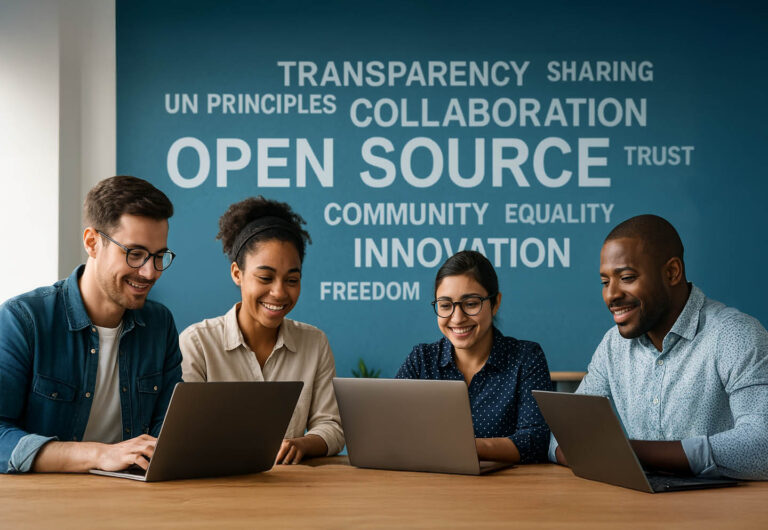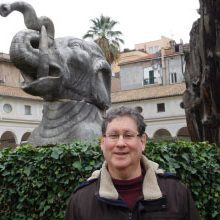Open Source in 2025: Looking at the United Nations Principles

The United Nations—which tops the list of important international bodies with functions such as the World Health Organization (WHO), the Universal Declaration of Human Rights, the UN Refugee Agency (UNHCR), and the United Nations Educational, Scientific and Cultural Organization (UNESCO)—has recently released a set of Open Source Principles. Although these are well-established and familiar within the open source community—as one would hope—they have a particular meaning at this time. This article delves into the implications of several principles for the design of computer systems, applications, and public organizations:
- Secure by design
- Foster inclusive participation and community building, along with RISE (recognize, incentivize, support and empower)
- Design for reusability
Although this article focuses on open source in software, its principles have widely coursed through modern society. The movement has influenced open information and open education, open government, open hardware, and open culture generally. The principles also present challenges in implementation, which I’ll examine at the end of the article.
Secure by Design
For this principle, the UN simply says, “Making security a priority in all software projects.” This advice is echoed by many experts and applies universally, not just to free and open source software. But in 2025, open source software is uniquely valuable to protect individuals and organizations.
To apply the “Secure by design” principle in this article, I’m interpreting the mandate broadly to include protecting the data of organizations and individuals from snooping–that is, privacy is included in the goal of security.
As explained by the Mozilla Foundation in their “Privacy Not Included” campaign, many applications collect and sell user data in ways that are hard to uncover.
Most proprietary applications nowadays have moved online to a Software-as-a-Service model, so there is no way to check what information they collect. The web browser itself collects information that can identify users and track their behavior, although knowledgeable users can take advantage of protections, such as those in Firefox’s Private Browsing and Apple’s Safari browser.
Government efforts to break into users’ private data have waxed and waned over the decades. While such efforts are commonly expected from authoritarian governments such as China and Russia, democracies such as the United Kingdom also get into the act.
In short, security includes protecting users from involuntarily surrendering personal data. Open source applications are subject to inspection so that the public can learn what is collected, and organizations who employ programmers can alter them to insert further protections.
We can’t control what governments and Software-as-a-Service vendors do—except through regulation, which has to be followed up by enforcement—but we can control the software on our own computers if it is open source.
Inclusive Participation and RISE
Running throughout the UN principles is a concern for meeting the needs of all computer users, regardless of ethnicity, geography, ability, gender, or culture. The principles go further than serving these users, however: it also expects a wide range of users to become part of the design and creation of the systems they use.
The RISE goals (recognize, incentivize, support and empower) provide a thumbnail roadmap of how to involve people in decisions about computing that ultimately affect them. One must start by discovering the people who have been previously excluded, and then take steps to bring them into the center of the creative effort. LPI believes that certification plays a role in empowerment, by letting outsiders without connections or other credentials prove their expertise.
The world is at a complex crossroad in its acceptance of differences. On the one hand, people who have felt excluded from decision-making have learned how to come together over the past several decades and to bring their demands to large institutions.
But a backlash to these movements has also developed. The resulting tension has unfolded as institutions create initiatives such as Diversity, Equity, and Inclusion committees or affirmative action programs, and then dismantle them either through external pressure or inertia. As efforts to compensate for past discrimination recede, even research into differences is being suppressed, eliminating the sources of knowledge that could benefit people in the future.
In recent decades, free and open source projects have consciously adopted efforts to broaden the ranks of their contributors, such as codes of conduct that prohibit harassment and educational projects such as Girls Who Code. The UN principles validate these efforts.
The great thing about open source is that people don’t have to ask for access or control. They can just take it, because the software or other resources are out in the open and available to all. Of course, it’s best when communities collaborate and the maintainers of the original project accept relevant changes from outsiders. Even when a break is necessary (a code fork, on the technical level), open source is more liberating than closed code.
Open participation and widescale recruitment also works at the government level. Effective public participation requires more than calls for proposals or open meetings. Technology for discussion, prioritizing needs, and voting can help focus participants on useful tasks.
Design for Reusability
This UN principle is defined as follows: “Designing projects to be interoperable across various platforms and ecosystems.” This is relevant to open source on many levels.
Proprietary software is often limited to particular use cases, and even specific hardware devices. Many people have experienced the loss of an important software tool when the manufacturer took it in a different direction to support a different business model.
In contrast, open source constantly broadens its scope. Take the Linux kernel, for instance. Originally developed for the Intel x86 processor used in personal computers, it now supports many architectures.
Anyone who can see a use for a free software product can extend it to support that use. If extending the software brings a conflict with some other use, the new project can split off (fork) and create a new product.
Finally, the code in free and open source software projects tends to migrate. People can use some library or algorithm for a totally different purpose, jump-starting their project and saving time and effort.
Turning principles into products
The UN Open Source Principles state the ideals and goals of open source. But open source is more than software or other tangibles; it’s a way of thinking as part of a community, of asking what each person can do for the common good. Cultivating this attitude is an uphill battle in the world of 2025.
Throughout the communities of free software and open source, practitioners complain about free riders. The practitioners are creating products out of passion, giving up the chance for riches in favor of modest compensation. However, companies with billions of dollars are using the products without paying those who make them.
In order to make software and other resources free for rural Latin Americans or the impoverished suburbs of Europe, those who have the money to fund the production of the resources must be willing to support it. Open source involves the realization that we all benefit from each other.
